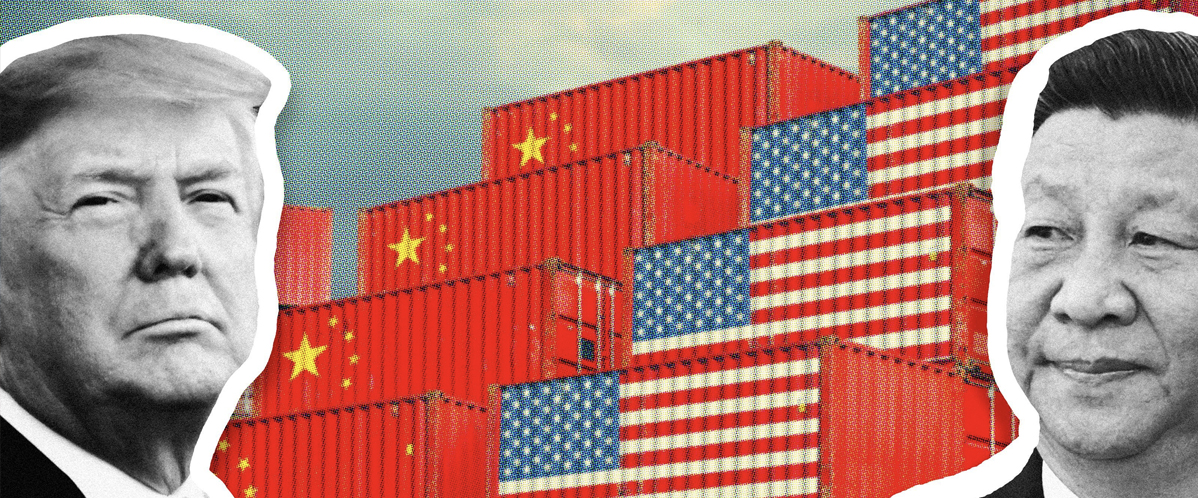The trade war between China and the USA has been building steadily since Donald Trump started imposing tariffs shortly after coming to office.
Just yesterday it was reported that, the Blackstone co-founder and C.E.O. Steve Schwarzman who has tried to serve as a bridge between Washington and Beijing, given his close ties to both. But in a The New York Times DealBook TimesTalk with Andrew Ross Sorkin, Mr. Schwarzman worried that the split between the U.S. and China was growing wider, with potentially disastrous consequences.
“We’ve got two countries that look like they’re decoupling,” Mr. Schwarzman told Andrew. “Which will end up damaging them long term, probably us long term.”
Mr. Schwarzman said that the onus was on China to find a solution to the trade war. At the moment, he said, Beijing thinks it is capable of waging battle for a long time. But it may be running out of ways to prop up its economy, since its interest rates are so low that any economic stimulus would be hard to pull off.
“If they go into a recession, it could look like Japan, which went into a recession and basically stayed at no growth” for a very long time, he added. (The WSJ notes that China’s economy faltered again last month, with industrial output and consumer demand both slowing down.)
Ultimately, Mr. Schwarzman believes both sides will have to come together. “We have to get balance back,” he told Andrew.
In Australia, experts are divided as to the effect on business, with some saying it has actually boosted key exports and others arguing that increased market volatility and tightened border controls make it harder for SMEs in particular to trade with China.
So which is true, and what can SMEs involved in trade with China do to help their own chances of success?
Is Australia the Quiet Winner?
It would be useful to be able to determine whether Australia is in fact a beneficiary of the ongoing struggle. J.P. Morgan noted recently that Australia has logged a 30% rise in nominal exports to China since early last year, around the time the US tariffs were first imposed. A lot of that is raw materials such as iron ore which China is still eagerly buying up to fill its vast demand for housing, for example.
J.P. Morgan also thinks Beijing will turn to stimulus rather than risk a deeper economic slowdown, and that could benefit Australian firms that export to China. These do include many SMEs, especially now that the Chinese have developed a taste for western foods.
On the other hand, the Chinese currency has been devalued recently to ensure some of the country’s exports are still competitive in the US despite the tariffs. That will make Australian goods more expensive to Chinese consumers, but on the other hand it makes outsourcing manufacturing to China even more enticing.
Reserve Bank of Australia Deputy Governor Guy Debelle said recently: “The domestic stimulus in China to offset the trade dispute has contributed to a short-term boost to the Australian economy?and significantly mitigated the impact of the trade disputes on us.”
On the other hand, there are reports that Australian coal cargoes have struggled to pass Chinese ports quickly—a headache for miners and widely viewed as a political manoeuvre by Beijing. And many observes feel that Australia is also vulnerable if Beijing calibrates its trade response to hurt Washington’s allies.
Michael Judge, head of OFX Australia and New Zealand, says the uncertainty is already having a detrimental impact on the Australian dollar – which again, can be positive or negative depending where your business stands, but ultimately he felt that trade wars have no real winners – even outsiders like Australia.
“We, as an economy and politically as well, would like to see a resolution. There might well be some bright spots and some industries within particular business units which are going to benefit, but overall I think we are poised for a move away broadly from protectionism,” Judge said in an interview recently.
What SMEs Can Do
The good news is that international trade remains an excellent way for ambitious SMEs to expand, and Australia’s relative proximity to China still offers many opportunities: on the one hand, manufacturing businesses have the option to shift production overseas; on the other, the sheer size of China’s rocketing middle class offers a vast market to those selling food, wine or fashion, for example.
There is a way for SMEs to take advantage of these opportunities without worrying about issues such as red tape and having to pay suppliers upfront before the good leave the port: it’s called Trade Finance.
Trade Finance for SMEs
Trade finance is specific business funding designed to meet an export order, or to facilitate an importing arrangement. It not only provides easy, secure financing for an SMEs’ overseas expansion, but can also help with red tape, logistics and working capital issues.
With an intelligent finance provider like OptiPay (OptiPay), businesses of all sizes can access a wide variety of trade finance services very quickly and easily – arranging for help verifying shipments, passing through customs, and giving the business the funding it needs.
Specialist trade finance always makes sense for SME importers and exporters. In times of volatility and uncertainty, it is doubly valuable.
Who is OptiPay?
OptiPay, one of Australia’s leading business finance providers, has been dedicated to helping small business owners solve cash flow challenges for over a decade and has provided $1.5 billion in business funding to more than 500 Australian businesses. OptiPay specialises in modern financing solutions such as invoice factoring, invoice finance, debtor finance, and lines of credit. OptiPay’s mission is to support business growth providing liquidity in as little as 24 hours, ensuring they have access to tomorrow’s cash flow today. This rapid access to funds helps businesses maintain smooth operations and seize growth opportunities without the stress of cash flow constraints. At OptiPay, we believe that healthy cash flow is the lifeblood of any successful business. Our commitment to helping businesses overcome financial hurdles and achieve their growth ambitions has solidified our reputation as a trusted partner in the business finance sector. Whether you are looking to stabilise your cash flow, expand your operations, or navigate financial challenges, OptiPay is here to support your journey with innovative and efficient financing solutions.



